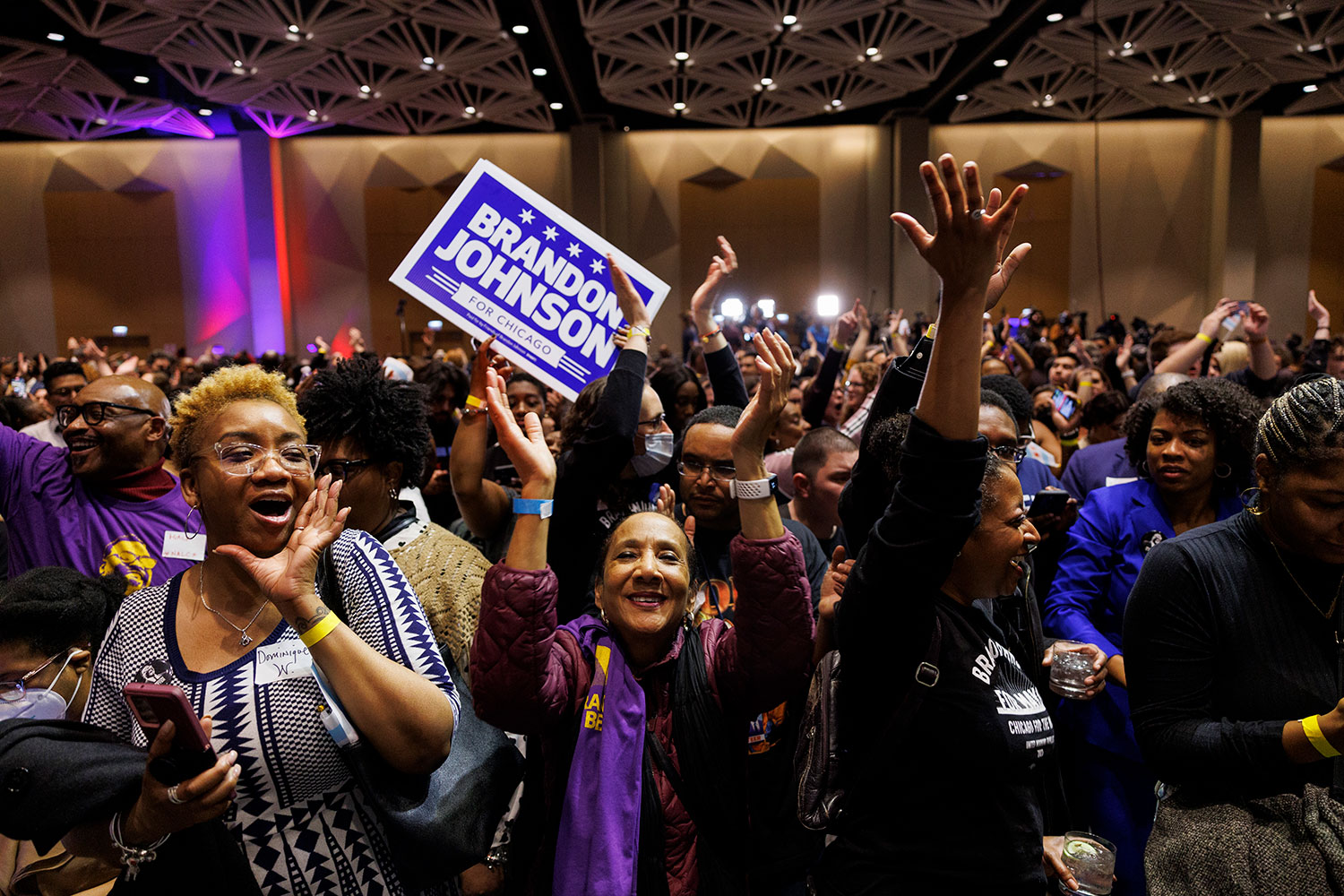On Tuesday afternoon, Brandon Johnson hit half a dozen polling places on the North Side, caravanning from Belmont-Cragin to Logan Square to Avondale to Rogers Park. Outside Goethe School, 2236 N. Rockwell St., he met a young volunteer who boasted of making “hundreds” of phone calls for the candidate.
“I feel great about the ground game,” Johnson said. “We’ve talked to thousands of people. We’ll be outspent, but we won’t be out-organized.”
Johnson was out-spent during the runoff, $18.1 million to $11.1 million. According to campaign aide Erika Wozniak, though, his campaign knocked on 18,000 doors election day morning.
While Johnson was racing between schools and parks, Paul Vallas was doing…nothing. After lunch at Manny’s Deli and an interview with WLS’s Steve Cochran, his campaign schedule was empty until an election night party at the Hyatt.
“He’s taking the afternoon off,” a campaign spokesperson explained.
That alone didn’t cost Vallas 16,000 votes, but it was indicative of the intensity gap between the two campaigns — the deciding factor in this election. Vallas had voters and contributors, but Johnson had stans — supporters who adopted his candidacy as a cause for which they were willing to work tirelessly. A former union organizer, Johnson comes out of the great Chicago tradition of community organizing, and his people-powered campaign overcame Vallas’s financial advantage. Craig Duchossois, the private investor, wrote Vallas a $500,000 check, but he wasn’t out canvassing in the early spring cold as dusk approached.
After losing his campaign for 50th Ward alderman, Mueze Bawany went back to work as a Chicago Public Schools teacher, and knocked on doors for Johnson five nights a week. At Johnson’s Election Night Party at the Marriott, Bawany was overcome with emotion. Cecilia Acevedo, a mother of two grammar school children, spent 15 to 20 hours a week canvassing and phone banking for Johnson, because she believed he would fund public schools.
“We were fighting for our lives,” explained Jonathan Nagy, a volunteer with United Neighbors of the 35th Ward. “This is a campaign for poor and working people. We have not had an elected representative who reflects our experience. This was a fight for survival.”
Introducing Johnson before his victory speech, Chicago Teachers Union President Stacy Davis Gates declared that “hope triumphed over fear. I ain’t never seen the city side with a dog whistle.” That was over-dramatizing. It’s true that Vallas’s supporters did seem to be motivated as much by dread of Johnson as affection for their own candidate. At any political moment, though, there is a party of hope and a party of memory. Johnson represented the party of hope, Vallas the party of memory. Vallas’s campaign, which won more than 80 percent of the vote in wards on the Northwest and Southwest sides, was the last stand for a tradition of white ethnic politics that goes back to Mayor Richard J. Daley. Vallas was one of them. He grew up in Roseland as the son of Greek-American restauranteurs, moved to the suburbs during the white flight era of the late 1960s and ’70s, when the neighborhood was changing to 90 percent Black, then returned to the city with a promise to bring back the good old days, when neighborhoods were safe. Gates was not over-dramatizing, though, when she said, “Tonight, you chose multi-racial, you chose multi-generational” — which was not what Edison Park and Mount Greenwood wanted.
“The first thing that I want to say is to the Chicagoans who did not vote for me,” Johnson began his victory speech. “Know that I care about you, and want to hear from you and work with you. And I’ll be the mayor for you, too.”
Then, the mayor-elect who had won a campaign from the bottom up promised — in pulpit language learned from his preacher father — a city that would be governed from the bottom up.
“With our voices and our votes, we have ushered in a new chapter in the history of our city,” he said. “The truth is, people have always worked for Chicago. When you wake up early to open the doors of your businesses, or teach middle school, or wear a badge to protect our streets, or nurse patients in need over by childcare services, you have always worked for this city. And now Chicago will begin to work for its people. Because tonight is a gateway to a new future for our city, a city where you can thrive regardless of who you love, or how much money you have in your bank account in a city that’s truly safer for everyone by investing in what actually works.”
The Chicago Garda Pipes and Drums, an Irish bagpipe troupe, paraded through the lobby of the Hyatt, but left Vallas’s party early, when it became clear they wouldn’t be playing a celebratory serenade. Meanwhile, at the Marriott, DJ Slugo led the crowd in the cha cha slide.
“Brandon Johnson, 13,000 with 95 percent of the vote in,” he crowed into the mic. “Make some noise! Let it go. Release that! Harold Washington’s turning over right now. Chicago’s got a new supermayor.”



